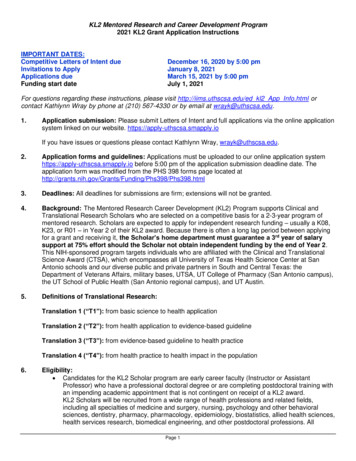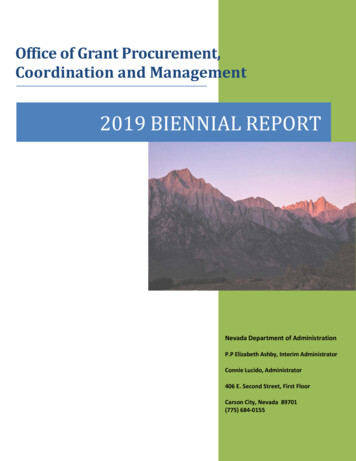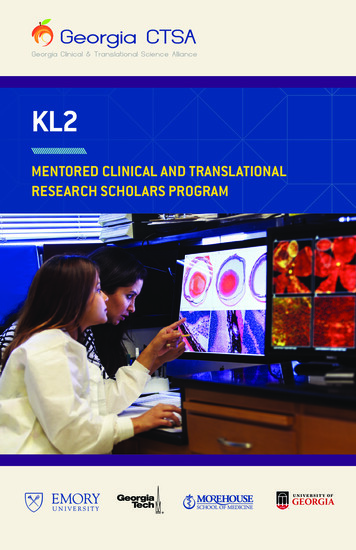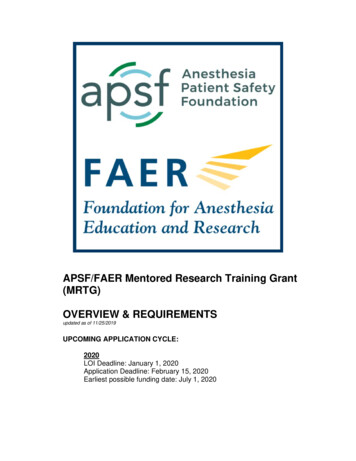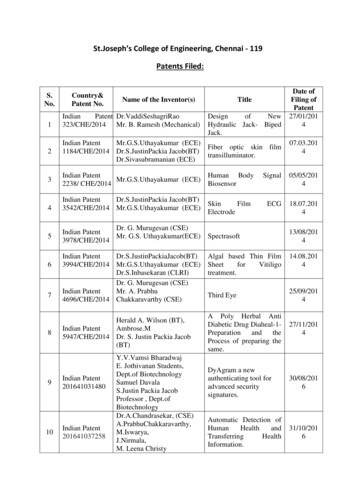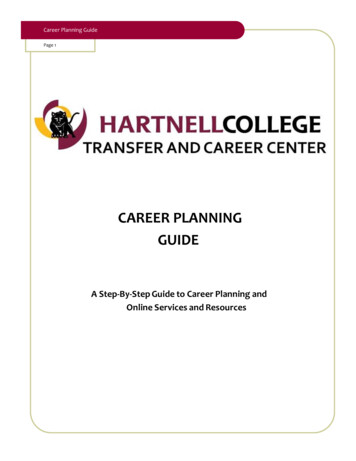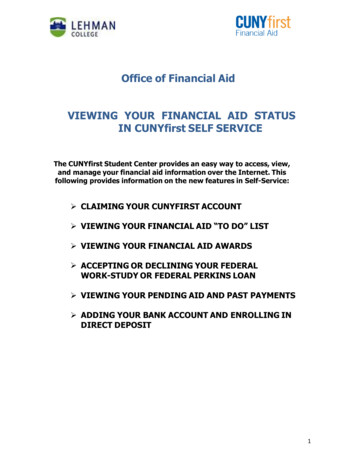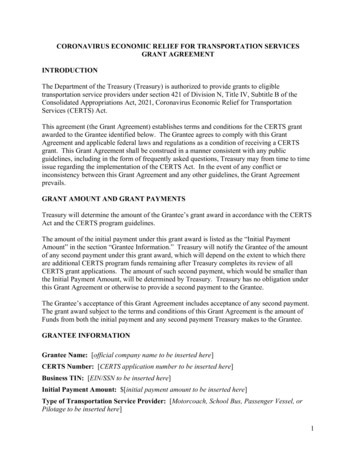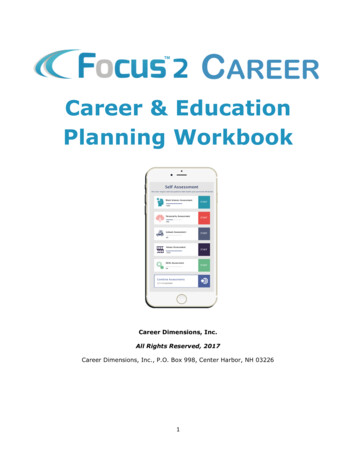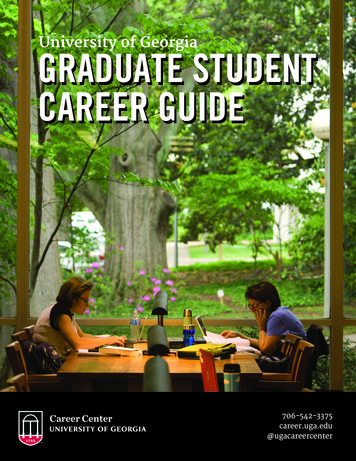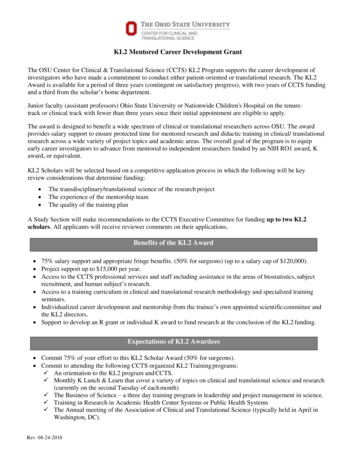
Transcription
KL2 Mentored Career Development GrantThe OSU Center for Clinical & Translational Science (CCTS) KL2 Program supports the career development ofinvestigators who have made a commitment to conduct either patient-oriented or translational research. The KL2Award is available for a period of three years (contingent on satisfactory progress), with two years of CCTS fundingand a third from the scholar’s home department.Junior faculty (assistant professors) Ohio State University or Nationwide Children's Hospital on the tenuretrack or clinical track with fewer than three years since their initial appointment are eligible to apply.The award is designed to benefit a wide spectrum of clinical or translational researchers across OSU. The awardprovides salary support to ensure protected time for mentored research and didactic training in clinical/ translationalresearch across a wide variety of project topics and academic areas. The overall goal of the program is to equipearly career investigators to advance from mentored to independent researchers funded by an NIH RO1 award, Kaward, or equivalent.KL2 Scholars will be selected based on a competitive application process in which the following will be keyreview considerations that determine funding: The transdisciplinary/translational science of the research projectThe experience of the mentorship teamThe quality of the training planA Study Section will make recommendations to the CCTS Executive Committee for funding up to two KL2scholars. All applicants will receive reviewer comments on their applications.Benefits of the KL2 Award 75% salary support and appropriate fringe benefits. (50% for surgeons) (up to a salary cap of 120,000). Project support up to 15,000 per year. Access to the CCTS professional services and staff including assistance in the areas of biostatistics, subjectrecruitment, and human subject’s research. Access to a training curriculum in clinical and translational research methodology and specialized trainingseminars. Individualized career development and mentorship from the trainee’s own appointed scientific committee andthe KL2 directors. Support to develop an R grant or individual K award to fund research at the conclusion of the KL2 funding.Expectations of KL2 Awardees Commit 75% of your effort to this KL2 Scholar Award (50% for surgeons). Commit to attending the following CCTS organized KL2 Training programs: An orientation to the KL2 program and CCTS. Monthly K Lunch & Learn that cover a variety of topics on clinical and translational science and research(currently on the second Tuesday of each month) The Business of Science – a three day training program in leadership and project management in science. Training in Research in Academic Health Center Systems or Public Health Systems The Annual meeting of the Association of Clinical and Translational Science (typically held in April inWashington, DC).Rev. 08-24-2018
KL2 Mentored Career Development Award2 Consultation privileges with the CCTS Translational Therapeutics Think Tank.Grant writing training in the Autumn or Winter of Year 2.Lead Mentor will attend CCTS mentor training, if he or she has not already done so.Completion of Phases 1 and 2 of the Innovation, Entrepreneurship and Commercialization certificateprogram for at least one technology product market research concept. Individualized coaching to enhance verbal communication skills Individual development plan will be developed in collaboration with KL2 leadership and project mentoringteams, and monitored quarterly (see Appendix 1). Progress reports will be required twice yearly on research progress and individual development planprogress. Annual written report and an oral presentation to either the CCTS Program Director or ExecutiveCommittees.Other Requirements: Applicants and mentors must become CCTS members by completing a CCTS membership form. https://ccts.osu.edu/form/become-a-memberAward recipients must promote objectivity in research by establishing standards that provide a reasonable expectationthat the design, conduct and reporting of research funded under NIH awards will be free from bias resulting from anInvestigator’s Financial Conflict of Interest.Any clinical trial supported by this grant will have an NCATS approved DSM plan or DSM Board, as appropriate, andthe researcher will comply with that plan.Clinical trials beyond the end of Phase IIA cannot be supported by this grant.The CCTS is funded through a CTSA grant from NIH’s National Center for Advancing Translational Science (NCATS).NCATS requires that they review and approve all OSU CCTS KL2 studies involving human subjects research prior tofunds being released. If you application is funded and involves human subjects research, the CCTS will requireadditional documentation to send to NCATS. NCATS generally completes their review in 30 days or less.If this award provides support for one or more clinical trials, by law (Title VIII, Section 801 of Public Law 110-85), the"responsible party" must register “applicable clinical trials” on the ClinicalTrials.gov Protocol Registration SystemInformation Website.No KL2 scholar or mentor will be permitted to work on any project involving live vertebrate animals or human subjectsthat has not been approved by the IACUC and/or IRB, as appropriate. If any scholar undertakes a project which includeshuman subject research studies, these must conform to the NIH policies on the inclusion of women, minorities, andchildren in study populations. Funds for non-compliant projects will be withheld.No funds may be drawn down from the payment system and no obligations may be made against Federal funds forresearch involving human subjects by any site engaged in such research for any period not covered by both an OHRPapproved Assurance and an IRB approval consistent with 45 CFR Part 46. See " Human Subjects Protections” Part II,Chapter 4 .pdf) for specific requirements and grantee responsibilitiesrelated to the protection of human subjects.All scholars appointed to this award who are involved with human subjects must have completed education on theprotection of human subjects and Good Clinical Practice (GCP) in accordance with NIH policy.Any individual involved in the design and conduct of a study not included in any certification must satisfy thisrequirement prior to participating in the project.All foreign activities must be cleared through the NIH foreign component tracking system.The Statement of Appointment form (PHS 2271) will be submitted for the awardee by CCTS staff each year at the timeof appointment through xTrain, and the awardee will comply with any requests for action or information related toxTrain appointment in a timely manner.
KL2 Mentored Career Development Award3KL2 EligibilityThe KL2 grant is for junior faculty at Ohio State University or Nationwide Children's Hospital on thetenure-track or clinical-track with three years or fewer since their initial appointment at the time ofapplication.The CCTS follows eligibility criteria for KL2 appointments as established by the National Institutes of Health(NIH), National Center for Advancing Translational Sciences (NCATS), funding opportunity Clinical andTranslational Science Award U54. See Part 2. Section III. 3 at -304.html.The following chart will help you determine your eligibility.Eligibility QuestionsDo you have a research or health-professional doctoral degree or itsequivalent (e.g., PhD, DDS, DVM, OD, MD, DO, or PharmD)Are you an assistant professor at Ohio State University or NationwideChildren's Hospital on the tenure-track or clinical trackAre you a Research Scientist or Research Professor not on clinical track atOSU or NCH?Citizenship StatusI am a US CitizenI am a permanent resident who possesses a permanent resident card(a Green Card).I am a non-citizen national.None of the AboveFundingHave you ever received an NIH career development award, such asK series awards K07, K08, K22, K23 or equivalent non-Public HealthService (PHS; parent organization of the NIH) award, from afoundation, for example?Are you applying at this time or do you have pending an applicationfor any other NIH mentored career development award, such as aK07, K08, K22, K23, or a similar award from a non-PHS source, suchas a foundation?Have you ever received an independent (i.e., non-mentored) NIHaward as Principal Investigator, such as an RO1 award? (Do notconsider NIH Small Grants [ R03 ])Exceptions: If you have received an NIH small grants (R03);exploratory developmental grants (R21); or SBIR, STTR grants (R43,R44)Have you ever been a project leader on a sub-project of a programproject (P01) or center grant (P50)? (Do not consider a prior T32 orF32 appointment.)Have you ever been PI on a non-PHS peer-reviewed research grantor career development grant, such as from a foundation orgovernment source other than NIH, that was over 100,000 directcosts per year?Career PositionHave you held your current position for three (3) years or less?Have you held your current position for four (4) years or more?EligibleYes: EligibleIneligibleYes: EligibleIneligibleYes: EligibleYes: EligibleYes: EligibleIneligibleIneligible if yesIneligible if yesIneligible if yesYes: EligibleIneligible if yesIneligible if yesYes: EligibleIneligibleIn addition: Applicants must be considered a Principal Investigator by the OSU Office of Research. Eligibilityinformation can be found at the Ohio State Office of Research website: -p-i/ Your Department or Division Chair or in some cases College Dean (whoever is authorized to make thesecommitments) must agree to the release time and salary support requirements of the KL2 by signing on the
KL2 Mentored Career Development Awardappropriate page contained in the RFA.4
KL2 Mentored Career Development Award5KL2 Letter of IntentTo be eligible, it is required that you indicate your intention to apply via the KL2 Letter of Intent formthat will be accessible through a link in the RFA and on the CCTS website.All Letters of Intent must be submitted through the online process by the due date listed of the RFA. No lateLetters of Intent will be accepted.The LOI form requires you to: Submit a project title and Abstract (250 words) Attach your NIH Biosketch Complete an eligibility checklist will clearly tell you if you are eligible to go on to apply for the KL2. Youshould review carefully the eligibility criteria above before applyingThe LOI will be used to1. Assess your eligibility for the KL2 award,2. Let program staff know of your intent to apply for the KL2 Award in order that they may organize theStudy Section.You will be notified if you should or should not proceed with the application.If you have questions or concerns, please contact the Program Manager, Stuart Hobbs at 614-685-5972 orstuart.hobbs@osumc.eduKL2 Application ChecklistApplications and supporting materials are to be completed by 11:59 p.m. EST on the date noted at the top ofthe RFA. No late applications will be accepted.All documents asked for in the application must be submitted online in PDF format with the file named using thefollowing guideline last first KL2 Application 2018 The Application consists of several parts. You can use the following as a checklist to help you gather, enter, andcomplete the application. Personal Information(Includes Employee ID Number, OSU name.#, and ERA Commons username) Campus Address Current University Employment Information Race, ethnicity, and additional such reporting information asked for by the NIH Project Title and Abstract (250 words) Project Description – 10 page maximum (to be uploaded to the Application; see these instructions forcomplete details) Personal Statement (1 page maximum) Who are you? Why have you chosen a research career? Your previous research experience? How you believe this training program will change the trajectory of your career or enhance yourmovement towards your goals? Career Development Plan (2 pages maximum)
KL2 Mentored Career Development Award6 Your Five Year Goals Role of your mentor(s) What are the gaps in your training this program will help fill? How will you fill those gaps? How will you meet the NIH requirements for training in responsible conduct of research Research Plan (7 pages maximum) Specific Aims Significance Innovation Approach Preliminary studies References to Scientific Literature (not included in page count. 3 pages maximum) IRB/IACUC: Human Subjects/Vertebrate Animals. If either one is applicable, include the regulatoryapproval letter. The on-line application form has a space to indicate applicability, regulatory status(pending/approved) and protocol number and approval date. NIH Formatted Biosketches (to be uploaded to the Application) Applicant Lead Mentor All other members of your Mentorship Team Letters of support from each member of your Mentorship Team Signature page (to be uploaded to the Application) Department Chair or Dean guaranteeing 75% (50% for surgeons) protected research time for theduration of the award and salary support ApplicantProject DescriptionThis section cannot exceed 10 type-written, single-spaced pages. Please use Arial size 11 font. Margins should be nosmaller than 0.5” on all sides.Personal Statement (1 page)A one-page personal statement addressing the following points: Who are you? Why have you chosen a research career?Your previous research experience?How you believe this training program will change the trajectory of your career or enhance yourmovement towards your goalsCareer Development Plan (2 pages)A two-page career development plan addressing the following points: Your five-year goals Where are the gaps in your training that this program will help fill How will you fill those gaps. Be as specific as possible (e.g., courses, workshops, individualizedtraining from an expert) How you will meet the NIH requirements for instruction in the responsible conduct of research es/NOT-OD-10-019.html for more information).SeeAppendix 2, below, for training options.Research Plan (7 pages)The three year research plan should include: Specific Aims and hypothesis of the project
KL2 Mentored Career Development Award 7Significance of the problem and how the proposed project will improve scientific knowledge and/orchange the field of study.Innovation – explain how the proposed project challenges current practice or creates a novel approach tothe problem.Approach – Describe the overall strategy, methodology, and analyses to be used to accomplish thespecific aims of the project, noting in particular how it is clinical and/or translational. Discuss potentialproblems, alternative strategies, and include a list of milestones/benchmarks for success anticipated toachieve the aims. For materials and methods, highlight powerful non-routine approaches, summarizeroutine approaches, and address statistical approach. Note: no clinical trials beyond the end of Phase IIAcan be funded.Preliminary Findings that help demonstrate feasibility.References to Scientific Literature (3 pages maximum) This section is not included in the 10-page limit butshould not exceed 3 pages.Scientific Mentorship TeamYour Scientific Mentorship Team must consist of at least three members. Your team must include among itsmembership a Lead Mentor and two other mentors (additional mentors are optional).Lead MentorIt is expected that the applicant will identify a faculty member mentor in his or her area of clinical or translationalresearch. Under guidance from your mentor, you will prepare a proposal that describes the clinical researchproject to be undertaken. Your mentor (or each co-mentor) is responsible for: Providing career development and counseling;Guiding and encouraging the design and execution of an original, high quality, clinical research project;Collaborating with the mentorship team to support the KL2 Scholar.Attending CCTS sponsored events including a mentor training program and an on-boarding session, as wellas other meetings with program leaders and administrators as needed.The letter of support from your lead mentor should acknowledge his or her understanding of these requirements,and describe their mentoring plan for your development. The letter should also describe the Mentors experiencewith mentoring, including number of mentees.At least TWO Additional members of the mentorship teamThe Mentorship Team provides additional expertise in the scientific area of research chosen for the project,complementary to the interests of the lead mentor. It is highly desirable that the other members of yourMentorship Team be drawn from another discipline so that they can provide transdisciplinary input into yourproject. Your mentorship team members may also include a University faculty member who is not a regularmember of the graduate faculty (e.g., an adjunct professor), a University staff member, or a qualified individualoutside the University who can provide expertise in your discipline.NIH BiosketchesYou must upload (as PDFs) NIH formatted biosketches of yourself, your lead mentor, and everyone else on yourMentor Team.Biosketch forms and instructions can be found here: T-OD15-032.html
KL2 Mentored Career Development Award8Letters of SupportLetters of support are required from your Lead Mentor and each member of your mentorship team.The letters should be addressed to:Cynthia Carnes, PharmD, PhDMark Wewers, MDThe Ohio State University338 West Tenth AvenueColumbus, OH 43210-1280Include these letters in your application packet.Further InformationPlease direct questions to the education programs manager, Stuart.Hobbs@osumc.edu (614-685-5972).The Co-Directors for the CCTS KL2 program are Cynthia Carnes, PharmD, PhD, and Mark Wewers, MD.Appendix 1: The Structured Individualized Development Plan DescribedEach new KL2 scholar will complete a baseline survey to inform the development of an individual training plan. Information willbe gathered to identify each scholar’s needs for training and to identify alignment with available training resources. This surveywill be evaluated by the co-Directors in concert with the mentoring plan submitted as part of the KL2 proposal. An individualdevelopment plan (IDP) will be developed via a collaborative process between the co-Directors, the trainee, and the leadscientific mentor. The IDP plan will outline training, coursework, conference and workshop plans as well as individualizedtraining; this will be planned in quarterly blocks for the duration of the KL2. The mentee is responsible for scheduling mentoringactivities through the Administrative Program Director; every six months, the lead mentor and KL2 co-Directors will monitorprogress and provide feedback on progress to each KL2 scholar.This process is outlined below so that it might inform the development of the career development plan included in theapplication.Baseline Individual Development Plan Process: Guiding QuestionsShort- and long-term research goalsStatistical and Biomedical Informatics consultation needs?Resources needed?This may include mentoring, collaboration, etc.What additional research skills are to be developed during the KL2? How will this be done? Timeline forcompletion? Includes review of mentoring plan submitted with KL2 applicationCareer Development Goals: topics to discussEntrepreneurial training goals?Communications skills development: needs assessmentCommunity Outreach: interests and goals?
KL2 Mentored Career Development Award9Sample Individual Development PlanRequired ElementsWorkshops/ClassesRigor and Reproducibility in science trainingBusiness of ScienceLaunch to Success Workshop (grantsmanship)Verbal Communications skills trainingSTEAM Factory public presentationCommunity engagement activityInnovation, Entrepreneurship and CommercializationCertificate. (Program in development.)Research ethics training (may choose which venuebest meets needs). (See Appendix 2)Implicit Bias TrainingAttendance & Presentation at ACTS meeting (atleast once)Attendance at national meeting in field (when not atACTS)Support for Research StudyStatistical ConsultationResearch data management consultationT4 presentationTarget Completion DateHeld biennially in OctoberWinter Semester of 2nd YearAnnually, 3rd week of AprilAnnualT4 is held the 2nd Wednesday of the month from 2 to 3PM in CCTS rm 240. Contact Annie Adrian atadrian.33@osu.edu to schedule your time with T4Selective:IRB and/or IACUC meeting attendanceCCTS Tools of the Trade programs: must attend oneper yearLunch and Learn Programs: must attend 8 per yearHeld monthlyComparative & Translational Medicine trainingMentor Development ProgramIndividualized training optionsMay include courses, workshops or othertrainingsOptional Training 1Optional Training 2Optional Training 3Etc.Completion Date
KL2 Mentored Career Development Award10Appendix 2: Options for Fulfilling Requirements in Responsible Conduct of ResearchCourses:Pharmacy 8520 - Research EthicsBasic concepts of integrity in the process of research. The course covers all areas of responsible conduct of researchincluding mentor/trainee roles, data management, animal use, human subjects. Often offered May term. The coursefulfills NIH requirement for research ethics. Repeatable to a maximum of 20 cr hrs. This course is progress graded (S/U)Vision Science 7960 - Ethics in Biomedical ResearchProvides a general understanding of the issues surrounding the ethical conduct of science including issues related toresearch involving human subjects, scientific misconduct, and authorship of scientific papers. Real-life case studies willbe used. 2 units.Nursing 7781: Responsible Conduct of ResearchConcepts and policies for the responsible conduct of research (RCOR), Institutional Review Boards, and disseminationof findings. 3 credits Autumn/Spring. ONLINE.MedColl 5000 - Responsible Conduct of Research & Research EthicsWithin research, ethics is considered to be the safeguard of both the researcher and the participant. This course willexamine cases which hold to demonstrate this statement. It will analyze a complex system of policies and regulationsthat govern human subject research and scientific Integrity. This class also satisfies the basic components of ResponsibleConduct of Research (RCR) education. 2 units.Webcast from the NIH: Ethical and Regulatory Aspects of Clinical Research:This is a live webcast that the CCTS hosts every Fall. The sessions are typically Wednesday mornings from mid-September toNovember. Participants watch the webcasts and take part in discussions. By attending 6 of 7 sessions and completing evaluationsand pre- and post- tests, get certification.More information: http://www.bioethics.nih.gov/courses/Nationwide Children’s Hospital offers a Responsible Conduct of Research Training Series during thesummer. The course fulfills NIH requirements. For details contact Katie.Campbell@nationwidechildrens.org.Other Courses offered at Ohio StateBiomedical Engineering 6983 - Research EthicsIntroduction to professional and ethical issues confronting biomedical research and researchers and approaches todealing with such issues. Prereq: Grad standing, or permission of instructor. 2 units.Comparative Studies 6750.02 - Fieldwork and Ethnography of CommunicationIntroduction to fieldwork and ethnographic writing in the humanities - interviewing, participant observation, andresearch ethics. Focus on the ethnography of communication and community representations. Prereq: Grad standing, orpermission of instructor. 3 unitsSurgery 8814 - Responsible Conduct of Research: Human Participants and the Use of Animals in Biomedical ResearchResponsible conduct of research with human participants and the use of animals in biomedical research is crucial tomaintaining the public trust in both the results and the methods of biomedical research. Repeatable to a maximum of 4cr hrs. 2 units
KL2 Mentored Career Development Award11Appendix 3: CCTS Career Development Awards ComparedPre-K Davis Bremer For early career physician-scientists/ investigatorscommitted to a career in academic medicine; whohave not previously been a PI on an NIH individualor institutional K, or R01 Award or received a pilotaward from the CCTS.vsKL2 For junior faculty who have not yet been a PI on amajor federal or private sector research grant or whohave not previously received a K award. Applicants must be physicians with OSU WexnerMedical Center credentials. For clinical and translational researchers with aresearch or health-professional doctoral degree. Provides salary and fringe support for up to a 10%FTE (capped at 15,000) and approximately 35,000 in research expense support for one year. Provides 75% salary support and research fundingfor three years (two years CCTS support; one yearhome college support). Aims to place junior physician-scientists on thepath to be competitive for NIH K CareerDevelopment Awards. Support to develop an R grant to fund research at theconclusion of the KL2 funding. WHO SHOULD APPLY? If you picture yourselfusing the data from your project to apply for a Kaward in one year, apply for the Pre-K DavisBremer. WHO SHOULD APPLY? If you picture yourselfusing the data from the proposed project to apply foran R grant in two to three years, apply for the KL2.Important note: You can apply for one or the other, but not both of these awards at the same time.Complete RFAs will be found at the CCTS website:
75% salary support and appropriate fringe benefits. (50% for surgeons) (up to a salary cap of 120,000). Project support up to 15,000 per year. Access to the CCTS professional services and staff including assistance in the areas of biostatistics, subject recruitment, and human subject's research.
